Junior School Teaching & Learning
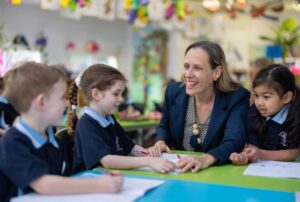 As you venture through the leafy surrounds of Prince of Peace you are immediately drawn to explore deeper and uncover the POP difference. Junior School (Prep to Year 6) provides a supportive and nurturing environment in which students’ strengths are developed and a growth mindset is fostered.
As you venture through the leafy surrounds of Prince of Peace you are immediately drawn to explore deeper and uncover the POP difference. Junior School (Prep to Year 6) provides a supportive and nurturing environment in which students’ strengths are developed and a growth mindset is fostered.
Our Junior School curriculum embraces a strong focus on literacy and numeracy development. Our teachers collaboratively plan learning to develop understanding of the 8 key areas of the Australian Curriculum and the Lutheran Education Australia subject of Christian Studies, which is an integral part of what we do and who we are as a Lutheran College. Learning experiences are designed to further develop key 21st Century Skills like critical thinking, communication, collaboration, creativity and passion for learning. We aim to ensure that learning at Prince of Peace is authentic, purposeful and connected to real world experiences.
On this Page
Explore the Early Years at PoP
Inquiry Units and Project Based Learning
Technology that Supports Learning
Explore the Early Years at PoP
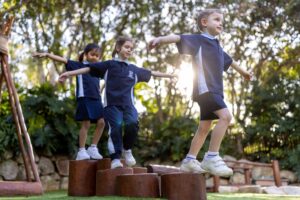 There is an explosion of the senses when you enter our Junior Campus! Embrace our beautiful learning spaces filled with light, nature, colour and texture, along with the busy sounds of students engaging with carefully chosen resources that support and enhance learning through play, relationships, and inquiry. Project Based Learning (PBL) and inquiry is embedded in our teaching program which enables students to learn by actively engaging in real-world and personally meaningful projects.
There is an explosion of the senses when you enter our Junior Campus! Embrace our beautiful learning spaces filled with light, nature, colour and texture, along with the busy sounds of students engaging with carefully chosen resources that support and enhance learning through play, relationships, and inquiry. Project Based Learning (PBL) and inquiry is embedded in our teaching program which enables students to learn by actively engaging in real-world and personally meaningful projects.
We value the natural curiosity and agency of each student as we support children to become resilient, confident, responsible, and compassionate citizens of the world, who have fun and love learning. Our Prep classes are set slightly away from the main school, and with their own play areas, provide space for students to make the transition into school life. The caring and talented Prep teaching team includes Educators and Learning Enrichment Officers with specialist Early Childhood qualifications who are committed to providing quality Early Childhood Education. The staff are continually inspired by contemporary research and responsive to current issues in developing programs that nurture and grow lifelong learners for the ever changing world.
During the Prep year, foundations are laid for the development of literacy and numeracy skills, with children supported to develop these skills at a rate appropriate for each child. Our early years literacy program, Initial Lit, is an evidence based, whole class literacy program that addresses the key components and essential knowledge and skills when developing successful readers and writers: phonemic awareness, phonics, fluency, vocabulary and comprehension. Initial Lit is a three year program that continues from Prep to Year 2 at the College.
Learning at POP in the Early Years emphasises children engaging through hands on activities, questioning, talking, sharing and testing their ideas. Learning experiences are designed to further develop key 21st Century Skills like critical thinking, communication, collaboration, creativity and passion for learning.
More than Education – the gift of Pastoral Care
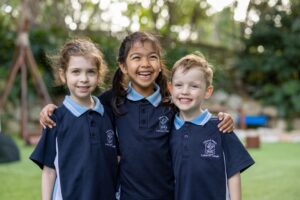 At Prince of Peace, we are committed to honouring relationships and creating a harmonious school environment. We understand that a child who is happy, has friends and feels supported is one who is willing to learn. Class teachers play an integral role for students, parents and carers who seek support.
At Prince of Peace, we are committed to honouring relationships and creating a harmonious school environment. We understand that a child who is happy, has friends and feels supported is one who is willing to learn. Class teachers play an integral role for students, parents and carers who seek support.
Your child’s wellbeing is not left to chance at Prince of Peace as teachers regularly plan learning experiences that develop emotional and social intelligence, resilience, gratitude and a growth mindset.
A Child-Centered Learning Environment (in the Early Years)
Drawing from the Reggio Emilia philosophy, which views the environment as the ‘third educator’, POP classrooms and outside spaces have been meticulously styled to enhance student learning and inquiry. Bump It Up walls and co-constructed resources help make learning visible for children. Children are encouraged to interact with a variety of materials, textures, and modes of expression both inside and outside to provide a multi-sensory learning environment.
Academic Program
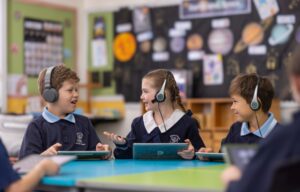 We believe each student’s educational experience should be characterised by three guiding principles that promote contemporary capabilities:
We believe each student’s educational experience should be characterised by three guiding principles that promote contemporary capabilities:
- Excellence through honour: we want students to pursue personal excellence; to honour each other, their God-given potential and to give of their best
- Learning with purpose: we wish to prepare all our students to become lifelong learners who are creative, critical thinkers, collaborators and communicators; who are multi-skilled, adaptable and innovative
- Growth through challenge: we believe it is important that students are provided with opportunities to push themselves, to be challenged to develop mastery in a supportive environment.
We are very proud of the five key principles that underpin Prince of Peace’s Teaching and Learning Framework and direct planning, teaching, assessment and reporting at the College. These five key principles are:
- High Expectations
- Positive Relationships
- Powerful Partnerships
- Life-Long Learning
- Responsive Teaching
Each year level at the Junior School has a sequenced curriculum, drawn from the Australian Curriculum and the Lutheran Education Australia Religious Studies framework for Christian Studies.
As the Australian Curriculum Assessment Reporting Authority continues to roll out new information each year, we will make adjustments to our whole-school curriculum planning.
Further Information
Inquiry Units and Project Based Learning
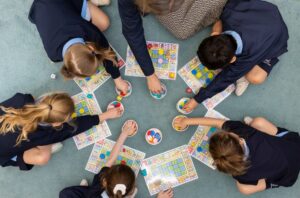 Our teachers aim to provide learning experiences that are challenging and engaging for students. Our Inquiry Units use a Project Based Learning approach to empower students to explore real-world problems and drive their own learning experience. Instead of receiving information passively, students engage in hands-on investigations to uncover knowledge and develop critical thinking and communication skills.
Our teachers aim to provide learning experiences that are challenging and engaging for students. Our Inquiry Units use a Project Based Learning approach to empower students to explore real-world problems and drive their own learning experience. Instead of receiving information passively, students engage in hands-on investigations to uncover knowledge and develop critical thinking and communication skills.
Advantages of Inquiry Based Learning:
- Promotes active engagement
- Develops critical thinking
- Encourages collaboration and teamwork
- Increases student motivation
- Fosters a love of learning
Inquiry/Project based learning starts with a question or problem to be solved. Students are provided with resources and tools to help them explore and discover answers and are encouraged to make observations, gather data and form conclusions. This way of learning allows students to present their findings, engage in discussions and build a deeper understanding. Students are encouraged to take charge of their learning and develop critical thinking skills that will serve them well in the future.
Visible Learning
Visible Learning enables teachers to be explicit and transparent with students about learning. Building from the work of John Hattie and Lyn Sharratt, teachers use a range of strategies, spaces and resources to inspire the imagination and creativity of learners, and encourage the process of inquiry, action and reflection.
“When teaching and learning are visible, there is a great likelihood of students reaching higher levels of achievement” John Hattie
Technology that Supports Learning
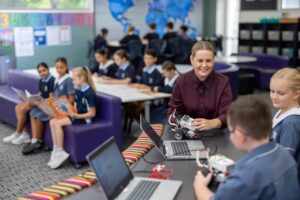 Prince of Peace has also developed a Prep to Year 12 Agile Digital Learning Strategy: Unlocking the Potential, which outlines the College’s commitment to the development of ICT capabilities that support effective transformation of learning. Our goals are to:
Prince of Peace has also developed a Prep to Year 12 Agile Digital Learning Strategy: Unlocking the Potential, which outlines the College’s commitment to the development of ICT capabilities that support effective transformation of learning. Our goals are to:
- ensure that the learner remains at the centre of teaching
- personalise the teaching and learning process
- provide opportunities for anywhere, anytime learning
Specialist Teachers
Students on the Junior Campus access specialist learning in the areas of Physical Education, The Arts – Dance, Drama, Visual Arts and Media Arts, Spanish and Music. Our specialist teachers bring a wealth of knowledge to these subject areas enabling students to develop their individual skills, interest and talents.
Each year our Arts, Music and Spanish teachers showcase student achievement in the Lower Primary and Upper Primary Arts Nights. These nights provide opportunities for students to present and perform in front of audiences and further developing skill and confidence in cultural pursuits.
Health and Physical Education (HPE)
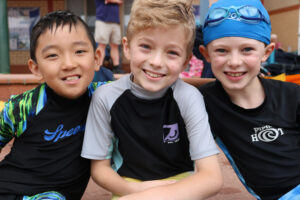 Our Junior Campus Heath and Physical Education (HPE) team runs a developmental HPE curriculum from Prep to Year 6. Basic skills are developed year on year, leading towards participation in individual and team sports.
Our Junior Campus Heath and Physical Education (HPE) team runs a developmental HPE curriculum from Prep to Year 6. Basic skills are developed year on year, leading towards participation in individual and team sports.
All students participate in our annual inter-house sports events, which include cross country, athletics and for students in Year 3 to Year 6, a swimming carnival. Events are run in an inclusive manner, providing a range of events to encompass all abilities. Participants can qualify to represent the College at NISSA events and district competitions and beyond.
A range of sporting activities are available during lunchtimes as student initiatives or arranged by staff. Fun inter-house competitions such as plank hold and three-legged races are well supported by students and staff alike.
Northern Independent Sporting Schools Association (NISSA) Sporting Opportunities
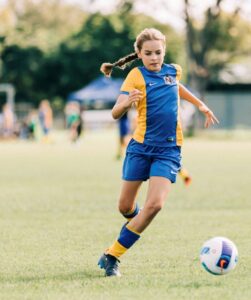 Students in Years 4 to 6 also train for and participate in the NISSA interschool Semester 1 and Semester 2 sports competitions, called Gala Days. Each semester students compete on 3 different days against other NISSA schools. T-Ball, Basketball and Touch Football competition occurs in Semester 1 with AFL, Soccer and Netball occurring in Semester 2. The focus for these competitions in the Junior School is on skill development, teamwork, sportsmanship, fun and engagement.
Students in Years 4 to 6 also train for and participate in the NISSA interschool Semester 1 and Semester 2 sports competitions, called Gala Days. Each semester students compete on 3 different days against other NISSA schools. T-Ball, Basketball and Touch Football competition occurs in Semester 1 with AFL, Soccer and Netball occurring in Semester 2. The focus for these competitions in the Junior School is on skill development, teamwork, sportsmanship, fun and engagement.
Students who qualify from the athletics, cross county and swimming carnivals are also invited to represent the College at these NISSA competitions.
North District and Regional Sporting Opportunities
Students who qualify form the athletics, cross county and swimming carnivals are invited to represent the College at District competitions and beyond. Students, aged 10 and above are also encouraged to try out for various District sporting teams like cricket, hockey, AFL etc. Information about the trials for these teams is distributed to families via the College Learning Portal – SEQTA.
Students can also participate in Extra-Curricular Sporting Opportunities such as Auskick, Tennis, and eSports.
Music
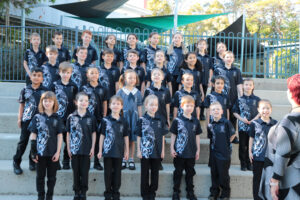 Thanks to the superb technical skills and infectious enthusiasm of our music team, classroom music is incredibly popular at our Junior Campus. As students’ progress through the school they have the opportunity to learn a variety of instruments as part of the curriculum. Singing, dancing, clapping, using their bodies as percussion instruments and even skipping are all ways that music is brought into the lives of our students.
Thanks to the superb technical skills and infectious enthusiasm of our music team, classroom music is incredibly popular at our Junior Campus. As students’ progress through the school they have the opportunity to learn a variety of instruments as part of the curriculum. Singing, dancing, clapping, using their bodies as percussion instruments and even skipping are all ways that music is brought into the lives of our students.
Extracurricular Music Opportunities
Students can also participate in Extracurricular Music opportunities such as:
- Learning an instrument
- Joining a school band, percussion ensemble or string ensemble
- Joining a choir
Spanish
Students in Prep to Year 6 benefit from a Language lesson each week as part of the suite of Specialist Lessons that are offered on the Junior Campus. Improved memory and brain function along with empathy and compassion for others are but a few good reasons to learn a language. Our wonderful Spanish teacher brings the language and culture of Spain to life for our students.
As one of the most commonly spoken languages in the world, students can continue in the Spanish language journey across the College in Middle and Senior School.
Spanish Extras
Throughout the year, our wonderful Spanish teacher offers opportunities for students to engage in with the Spanish culture during break times. Spanish dancing, singing and performing Spanish plays have been favourite cultural experiences.
The Arts – Visual Arts, Dance, Drama and Media Arts
This diverse specialist learning area provides much joy for many of our learners as they develop skills and talents. Each term is carefully planned with a different section of the Arts and provides opportunities for students to explore, develop skill, create, present and perform.
The Arts Extras
Students are encouraged to further their skills by joining a break time Dance Club or try out one of the other Arts opportunities that occur throughout the year.
 SEQTA Engage
SEQTA Engage